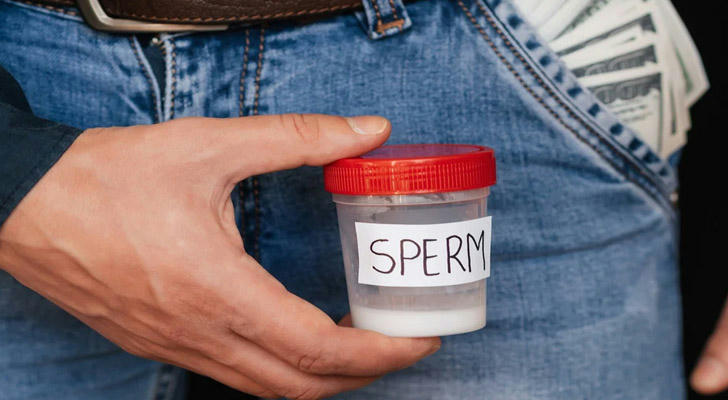Becoming a Sperm Donor: How to Earn Generous Rewards and Extra Income
Sperm donation is a scientific process that not only helps families in need but also offers a way to earn extra income. As more fertility clinics and sperm banks welcome new donors, the opportunity to contribute to scientific advancements and assist individuals on their path to parenthood has grown significantly. This article explains what sperm donation entails, who is eligible, and how donors can earn generous rewards while making a meaningful contribution.

1. Understanding Sperm Donation
Sperm donation involves a healthy man donating his sperm to a sperm bank or fertility clinic. These donations are used for various purposes, such as helping individuals or couples conceive through artificial insemination or in vitro fertilization (IVF). The process is carefully regulated to ensure safety and quality, with rigorous screening procedures that guarantee the donated sperm meets all health and genetic standards.
A typical donation session involves providing a semen sample in a private, comfortable setting at a certified facility. After collection, the sample is analyzed for sperm count, motility, and overall quality. Only donors who meet strict criteria are accepted, ensuring that the sperm used for conception is of the highest quality.
2. Why Consider Becoming a Donor?
There are several reasons why becoming a sperm donor can be an attractive option:
Financial Incentives: One of the primary benefits is the financial reward. Many sperm banks offer compensation ranging from $70 to $150 per donation. For regular donors, the cumulative income can be substantial, with some earning between $1,000 and $1,500 per month.
Helping Others: Donating sperm provides a valuable service to individuals and couples struggling with infertility. Knowing that the donation could help build a family can be personally fulfilling.
Minimal Time Commitment: The donation process usually takes only 30 to 60 minutes per session, making it easy to fit into a busy schedule.
Confidentiality: Reputable sperm banks maintain strict confidentiality regarding donor information, ensuring that personal details remain private.
Flexibility: The donation schedule is often flexible, allowing donors to contribute regularly without disrupting their daily routines.
3. Eligibility Criteria and the Screening Process
Sperm banks have specific eligibility criteria to ensure that only healthy, high-quality donations are accepted. While requirements can vary slightly among institutions, common criteria include:
Age: Most sperm banks require donors to be between 18 and 39 years old, though some may have a stricter upper age limit.
Health and Lifestyle: Donors must be in good physical and mental health, with no history of genetic disorders, sexually transmitted infections, or substance abuse. A detailed medical history and lifestyle questionnaire are usually required.
Genetic Screening: Potential donors undergo genetic screening to identify any hereditary conditions that might affect offspring.
Semen Analysis: The donation is rigorously analyzed to ensure a sufficient sperm count, proper motility, and overall quality.
Background and Education: While not always mandatory, some institutions prefer donors with higher education levels or specific achievements, although the focus remains on health and genetic suitability.
These screening processes help maintain high standards and ensure that donors who are accepted truly contribute to the success of fertility treatments.
4. The Compensation and Reward System
Compensation for sperm donation is designed to reward donors fairly for their time and contribution. Payments are made on a per-donation basis, and donors who contribute regularly can accumulate a significant amount of extra income. While most donors report earnings between $70 and $150 per donation, bonus incentives for consistent participation or meeting additional criteria may be offered by some facilities.
The financial rewards complement the personal satisfaction of knowing that a donation can help families achieve their dreams of parenthood. This dual benefit—financial gain combined with a sense of purpose—makes sperm donation an appealing option for many eligible men.
5. How to Get Started
Interested individuals should begin by researching reputable sperm banks or fertility clinics. Many institutions provide detailed information on their websites about the donation process, eligibility criteria, and compensation rates. Contacting a facility directly can provide specific details and the opportunity to schedule an initial consultation.
The application process typically includes the following steps:
Online Application: Candidates fill out a form providing personal and health information.
Screening Process: This includes medical tests, genetic screening, and a semen analysis.
Regular Donations: Once approved, donors are scheduled for regular donation sessions based on the facility’s requirements.
Taking these steps allows prospective donors to embark on a journey that offers both financial rewards and the opportunity to make a meaningful impact.
6. The Benefits of Donating
In addition to the monetary compensation, sperm donation can provide other significant benefits. Many donors appreciate the minimal time investment compared to other side-income options. The process is straightforward and non-invasive, making it an efficient way to earn extra money without major disruptions to everyday life. Furthermore, the contribution to helping families achieve parenthood adds a layer of personal fulfillment that extends beyond financial gain.

7. Conclusion
Sperm donation offers a unique opportunity for eligible men to earn generous rewards while playing a crucial role in helping individuals and couples build families. With well-structured screening processes, clear eligibility criteria, and a straightforward application process, the pathway to becoming a donor is accessible and rewarding. The financial incentives, combined with the personal satisfaction of contributing to others' lives, make sperm donation a viable option for those seeking extra income without significant time commitments.
For anyone considering this option, thorough research and consultation with reputable sperm banks are essential first steps. With the right preparation and commitment, becoming a sperm donor can provide a meaningful and financially beneficial experience, opening a door to making a difference in the lives of many while enjoying a rewarding side income.
